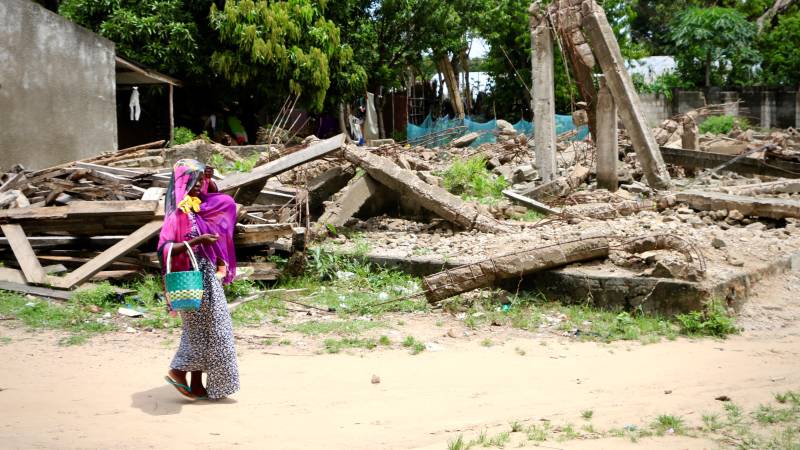Extremists in northern Mozambique declare goal of caliphate

Stay tuned with 24 News HD Android App

A shadowy Islamist group that has terrorised northern Mozambique for more than two years has suddenly become more brazen, unmasking its fighters and openly declaring its goal of turning the gas-rich region into a caliphate.
In recent weeks, the jihadists have seized government buildings, robbed banks, blocked roads and hoisted their black-and-white flag over towns and villages across Cabo Delgado province. "We want everyone here to apply Islamic law," a Kalashnikov-wielding group member told terrified residents in a video that appeared to have been shot in Mocimboa da Praia after a recent attack.
Mocimboa da Praia is where the militants staged their first attack, back in October 2017. Until recently, the identity of the assailants had remained unclear and their declared intentions unknown.
But the latest videos, the jihadists no longer bother covering their faces. "We don't want a government from unbelievers, we want a government from Allah," the group member added, speaking in the local Kimwani language to residents rounded up for a rally.
For more than two years the jihadists mainly targeted isolated villages, killing more than 700 people, according to the French aid group MSF, and displacing at least 200,000, according to a local Catholic archbishop, Dom Luiz Fernando.
Last month the group grew bolder and ventured back into Mocimboa da Paia, bursting into the town before sunrise to ransack government and military institutions. They have since emerged from their hideouts and openly taken control of three Cabo Delgado districts.
Locally they are known as Al-Shabaab, although they have no known links to the ruthless jihadist group of that name operating in Somalia. Islamic State Central Africa Province (ISCAP), affiliated with the Islamic State group, has claimed the Mocimboa attack, as it has in a few previous attacks since last year.
Struggle against insurgency
"From the images and from what the insurgents said, we know that these men are from the town of Mocimboa da Praia and that they belong to the group that made the first insurgents attack in October 2017," said African history expert Eric Morier-Genoud, a senior lecturer at Queen's University Belfast in Northern Ireland. "We hear them again lay out their ultimate objective: the establishment of an Islamist state regulated by Shari’a rule."
Thousands of people have escaped to the port city of Pemba, the capital of Cabo Delgado, seeking refuge among friends and relatives. Military troops and special police units deployed to Cabo Delgado have failed to rein in the insurgency.
The latest spate of attacks prompted the government to hire a private South African military company that has sent helicopters to help stem the insurgency, according to several local sources and a security expert.
Security expert Jasmine Opperman is sceptical about "hunting Islamists from the sky". "It might (work) in the short term," she told AFP. But "you cannot solve the history of neglect in Cabo Delgado by means of a military operation."
One chopper reportedly made an emergency landing on Friday after being hit by a round, according to various sources, although AFP was unable to independently confirm the information. The government in Maputo seldom comments on military operations in the area.
Mozambican political expert Adriano Nuvunga blames the security failure on the military's long-standing distrust of politicians. The attackers "may be our cousins in the army," said Nuvunga, who teaches at Eduardo Mondlane University in the capital Maputo.
"And the way they don't attack civilians lately (suggests) that it is a war for natural mineral resources that are in the province," he added.
'War for natural resources'
Cabo Delgado is home to vast natural gas reserves and accounts for up to 80 percent of the world's ruby output. This abundance of natural wealth in one of the country's poorest provinces makes it a tinderbox of potential conflict over resources.
French company Total owns a $25 billion (22.91-billion-euro) stake in a liquefied natural gas (LNG) project in Palma around 60 kilometres (40 miles) from Mocimboa da Praia. Exxon Mobil is also investing billions in the Rovuma basin LNG project off Mozambique's northern coastline.
The oil giants have repeatedly called on the government to deploy more soldiers to the area. None of the LNG projects has so far come under attack, but operations have already been weighed down by the unrest. "(The) insurgents attack roads and have attacked the strategic town of Mocimboa da Praia with its airport and port," said Morier-Genoud. "LNG (corporations) will soon also need to contract thousands of workers and these individuals risk becoming targets," he warned.
